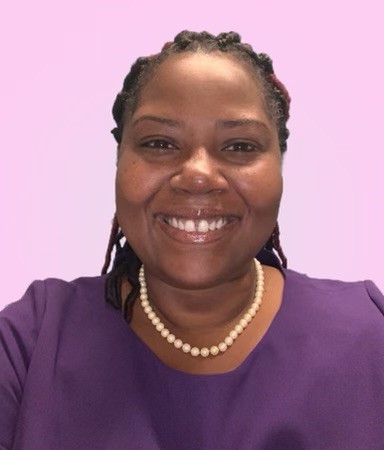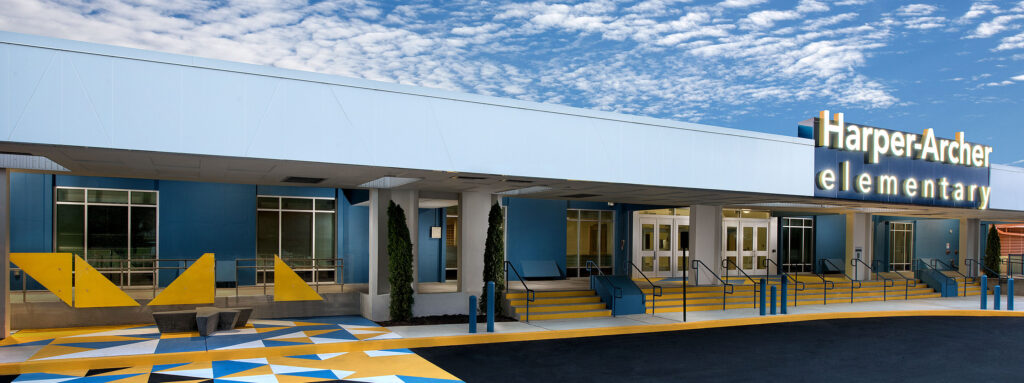Harper-Archer Elementary School may sound familiar to you, even if you don’t live in Atlanta, Georgia. The school, which serves nearly 700 Atlanta Public Schools (APS) students in west Atlanta, was the subject of an in-depth Atlanta Journal-Constitution series in 2019. Its principal, Dr. Dione Simon, is a former APS Principal of the Year. She is well-known for her grit, heart, and experience, as well as her capability to bring staff along. Over the past two years, I have witnessed all of this in my work with Dr. Simon, her school leadership team, teachers, and community members to harness their collective power to transform the Harper-Archer school community.
As a senior manager for TNTP’s ATL Leadership Network project, I work with Harper-Archer and several APS schools to build their leadership capacity to sustain school transformation. In the AJC series, Dr. Simon is quoted as saying, “I can’t coach you into believing that our children can learn at high levels. You can teach anywhere, but teaching at Harper-Archer is different. I wanted people who wanted to be a part of that difference.”
True to her word, high expectations are a priority at Harper-Archer—one Dr. Simon shares with her entire staff. I recently sat down with Dr. Simon and third-grade teacher Hannah Moses, a member of the school leadership team, to talk about Harper-Archer’s focus on high expectations. We started with where this focus originated—TNTP’s Instructional Culture Insight Survey
Harper-Archer has been through three cycles with the Insight survey. What role did the survey play in helping to identify high expectations as an area of focus for the school?
Dr. Simon: I don’t believe we truly realized and focused on all of these components as part of our instructional culture until we started to engage with TNTP. We knew the culture we wanted to provide. However, our Insight results, which were just above the national average, didn’t match up. I felt they should be much higher, specifically in the area of academic opportunity. It bothered me because I know that if we don’t all believe in our children’s potential—every child’s potential—then we can’t do the work of turnaround and our students can’t be successful. When I saw the Insight data, it aligned with what I was seeing in the academic opportunities we were providing our kids that included each of us demonstrating high expectations; thus, providing consistent grade-level content. I knew we had to address the issues around high expectations to get closer to our vision of becoming high-performing.
Ms. Moses: When we reviewed our Insight results, we could see, for example, where we weren’t giving students grade-level content, which led to questions about why that was. Do we not believe our students need and deserve grade-level content? We recognized the need to change our focus to shifting our mindset. Belief comes first.
How do you define high expectations, and how do you talk about high expectations in the Harper-Archer community?
Dr. Simon: I have an uncompromising belief that all our scholars can reach their potential. Uncompromising. No one can tell me anything different about any of the children that I get a chance to serve every day. When I hear conversations that don’t reflect this uncompromising belief, I have to speak to that. I have to respond to it now—not later, not next week, not in the next faculty meeting. Every conversation goes back to: What is it that you believe about our children? Sometimes, we say, “Oh, but I love them, so I’ll give them something that I know that they can do. I love them, so I’m going to go back a grade level or two in my instruction or the texts I’m providing.” And I say to that, “If you love me, then you’ll give me what I need. And what I need is grade-level, appropriate work with high support.”
As we continue to call it out when we hear it, a mindset shift happens. Everybody doesn’t arrive there at the same time, nor does everybody need to have the conversation. Some people just believe. I just believe. I absolutely positively believe this child can be successful. Period. We just have to create the conditions and the environment to give them exactly what they need to be successful. At Harper-Archer, that means high expectations with high support.
Harper-Archer has something called Think Tank Tuesdays. Can you tell us more about that?
Dr. Simon: There’s a group of people—Hannah’s one of them—who were gathering in the principal’s conference room every day after school. They would come from bus duty and just end up there, reflecting on the day and talking about how to get better. It was during one of those afternoons that we created a list of topics on which we wanted to engage the entire staff.
Ms. Moses: Think Tank Tuesdays is an opportunity to engage more people in the discussion beyond our SLT. During these sessions, master teacher leaders often co-facilitate—it isn’t just Dr. Simon—and it’s our role to push our colleagues to have a voice in the conversation. I think that Think Tank Tuesdays have helped more teachers feel like they have a voice and are part of the decisions. As a result, when they’re in their classrooms, they’re doing things because it’s what they believe, not just because it’s what they’ve been told to do.
As an SLT, we come up with guiding questions to keep us focused. Sometimes, it’s an opportunity to just come and bring your ideas. Other times, we have research that we all look at together. Some sessions are dedicated to discussing our beliefs about a specific topic, such as providing grade-level work to all students.
Dr. Simon: One of the pieces of research that we reviewed together in a Think Tank Tuesdays session was The Opportunity Myth. I brought it to the whole team because of the impact it had on me and my mindset early in my engagement with the ATL Leadership Network. It helped me focus and realize that we can have all these other things or think that we have them, but if we aren’t addressing a mindset of high expectations, we aren’t doing the right work. The Opportunity Myth is behind what we have adopted at Harper-Archer as our Big Four: High expectations, strong instruction, grade-appropriate assignments, and deep engagement.
Harper-Archer Elementary School Principal, Dr. Dione Simon.
How do you know that your students are capable of meeting high expectations?
Dr. Simon: It’s a mindset shift because we love them so much. There’s a productive struggle that must occur. To quote Frederick Douglass, “Without struggle, there is no progress.” I have a true, deep belief in acceleration versus remediation. There’s no way you’ll catch up if all I’m doing is remediating and intervening. We have to accelerate, and the way to accelerate kids is to expose them to what is expected of them with the right amount of support and type of scaffolds.
Ms. Moses: It has been a shift. Often teachers see their kids reading at a certain level and then only give them texts at that level. For example, if a student is in fourth grade and we never expose them to fourth-grade content, then they’ve missed all that grade-level content. It’s about being strategic in how we expose students to grade-level content, giving them access to it, and the support they need to be successful with it.
We talk to our students. We say, “I need you to know this is where you need to be this year, and if we’re not there, then you as the student and me as the teacher must work with urgency to get you there.” Essentially, we communicate to students performing below grade-level that they aren’t in this alone. We can’t just keep exposing them to below grade-level work because they will never catch up.
Dr. Simon: In practice, this might look like revisiting grade-level text over and over, so by the time we move to the next text, a student has immersed themselves and engaged in the text so many times, they’re better for it. They learned more vocabulary. They have become more fluent in reading the grade level text; and, they have gained greater comprehension of the text. This will help them see progress and greater success.
Ms. Moses: And it just takes that one student—it might not even be your student—who achieves success. You look at those success stories and say, “If they can, every child can.”
What progress would you like to see around high expectations at Harper-Archer in the year ahead?
Dr. Simon: I’d like to see that we get to a point where everyone at Harper-Archer has this uncompromising belief in who our children are and what they can do. I’d like to see teachers use the protocols and resources—which for us is the assignment review protocol and instructional practices guide for English Language Arts—to ensure that every assignment they give reflects a culture of high expectations. We’ll support teachers with the mindset piece, but they also know that to whom much is given, much is required. I’m only going to coach for so long around high expectations. Believing in every child is something I won’t compromise on.
You’ve really embraced your school’s participation in the ATL Leadership Network. What advice do you have for leaders regarding how to best leverage this type of outside support, and what is the mindset necessary to maximize the impact of a partnership for your school?
Dr. Simon: As a leader, you can’t do this work alone. You need to leverage the support of people who have knowledge and resources, and who have done this work beyond your school. External partnerships and opportunities, like the ones we access as part of the ATL Leadership Network, can help you focus, align, improve, and strengthen your school’s instructional culture. While I recommend leaning into these opportunities, I have found that there are two keys to making them work. First, you must tell your partners what you need. That was a game-changer for us at Harper-Archer, at the end of the first year in the Network when you, Solona, asked us what we needed. I told you what I needed and what our team needed, and you responded to that need. Second, be open. Sometimes, as a leader, you prefer to handle your own “stuff.” However, I believe that you must be vulnerable to really grow. The help is there, but you must be open to receiving it.








